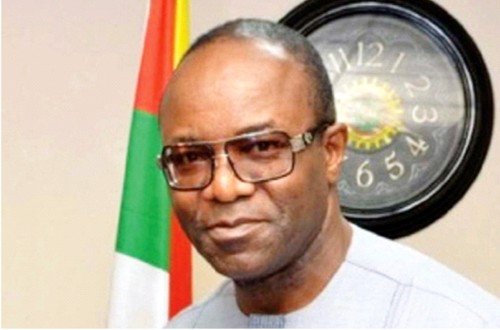As a result of the decline in oil production from the projected 2.2million barrels per day (mb/d) to an average of 1.5mb/d and the restiveness in the Niger Delta region which has affected production, the Federal Government has planned to make up for the shortfall in the 2016 budget with an excess production of 900,000 mb/d when normalcy finally returns to the region.
Minister of State for Petroleum, Dr. Emmanuel Ibe Kachikwu, made this known in a conversation with Richard Quest on CNN’s Quest Means Business, Monday.
He said already, government has made adjustment for the excess production since it appeared that it would be difficult to realise the 2.2mbd production budgeted for in this year’s budget.
“It is going to be difficult to catch up with the 2.2million barrels on which the 2016 budget was based. But we are certainly going to try, once things have calmed down and there is full production. We will need 900,000 bpd excess production to catch up and that is the projection that we are working on now.”
Kachikwu however, admitted that production has reduced in the last five months of militancy in the Niger Delta, but expressed optimism that the crisis could end in the next few months, as he said that government has been making frantic efforts at engaging, dialoguing with the stakeholders to resolve the crisis in the region.
“Yes it is a difficult time but like you rightly said, production is average of 1.5million barrels per day. And we intend to get along: first reason it is because of the militancy problem we have in the Niger Delta.
“We are putting a lot of energy around it. There is a lot of dialogue, a lot of engagements, a lot of security meetings to try and resolve this. President Muhammadu Buhari is very concerned about this .
“Executive time is being given to this. We are expecting and hoping that over the next one month, two months, we will find some final solutions that will bring solution up. Once we have done that, it is obvious that we have lost quite some months, five six months of continuos problems.”
The minister doubted if the Organization of Petroleum Exporting Countries (OPEC) would cut production in its September meeting, stating that the possibility is remote owing to the organisations’ failure to unite on the issue.
He pointed out that OPEC only produces 30 per cent of world oil, stressing that unless there is a dialogue with the producers of the 70 per cent, the organization’s 30 per cent would not make a significant difference.
He maintained that: “I am not too optimistic about that. We have tried that a couple of time and we have not been able to get the kind of unity we need to affect those cuts, neither are some of us convinced that once the cut is effected, it will have such a major impact.
“As you know, OPEC produces about 30 per cent of world oil today. So unless we reach some commonality and dialogue with the 70 per cent producers, you will find out that the 30 per cent of the fraction won’t make the difference. So I am not too optimistic about that but the only thing I think we should continue to do, is to be aggressive about the dialogue with the 70 per cent producers, and that is finally what is going to get us there,” he stated.

